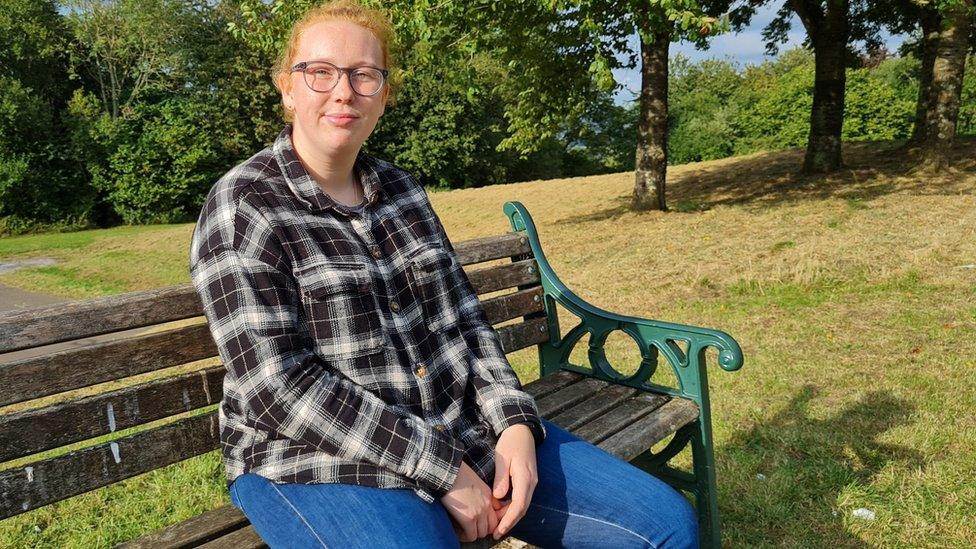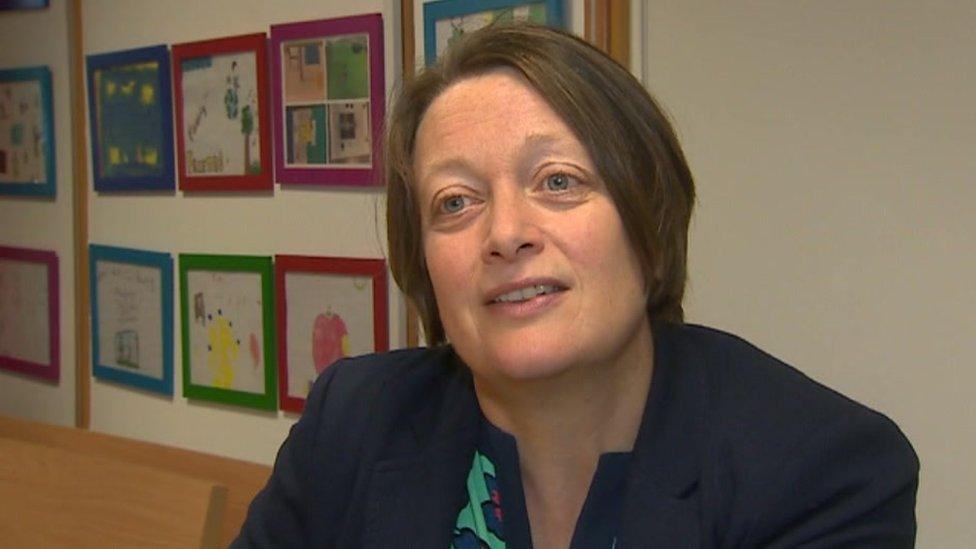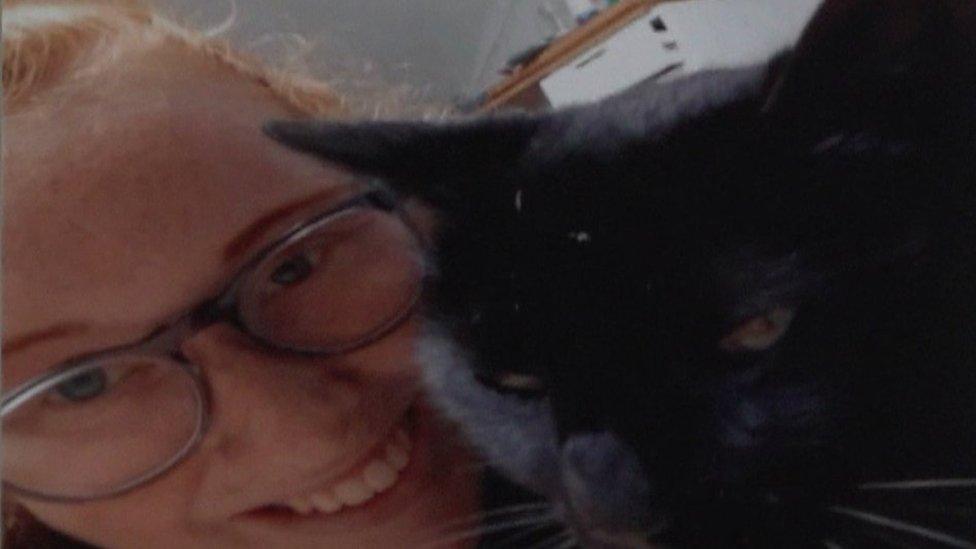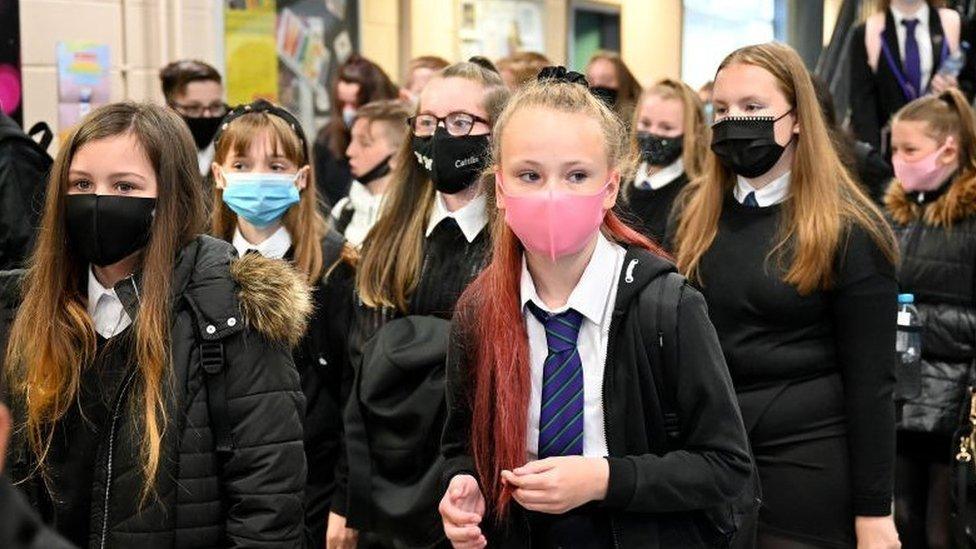Mental health: Call for sanctuaries for young in crisis
- Published

Sarah Wynne, 19, said she had to wait months for help after being diagnosed with depression aged 13
Support for young people in a mental health crisis needs to be improved urgently, according to the children's commissioner for Wales.
Prof Sally Holland wants "sanctuaries" made available when they need help.
She said it was not acceptable for young people to have to call the police, go to A&E or use adult services when they are aged 16 or 17.
The Welsh government said it was investing in services as young people's mental health was a "top priority".
Prof Holland said that she wanted to see a "completely different model" of emergency mental health services for young people.
"There's been some great work in the community services, but what we haven't cracked at all, anywhere in Wales, is what happens at that point in emergency - especially at three in the morning or 11 o'clock at night," she said.
Prof Holland has proposed the introduction of places where young people could go if they were in a crisis or felt unsafe, or worried they might hurt themselves.
She said the sanctuary model had already been introduced in adult mental health services but that there were not "any good models" for young people in a crisis.
Publishing her annual report, the commissioner also argued that children and young people's mental health had to be a greater priority and that for too long it had been a "Cinderella service" which received less funding compared with adult mental health.
"It's really urgent," she said. "We've known about this issue for years.
"Young people are telling me they've had terrible experiences, parents are saying there are moments where they could not keep their children safe at home but, also, they did not feel they had a safe place to take them.
"And clinicians have said they know they were not providing the right care for children in a crisis, especially in out of hours, so it's an urgent matter and I would really like to see good progress on this over the next year."
Adult settings in A&E units can be very distressing for young people in crisis.

Children's commissioner Sally Holland: "Young people are telling me they've had terrible experiences"
Sarah Wynne, 19, from the Vale of Glamorgan, has had mental ill health since she was a child.
Her family said she was unhappy in school and that escalated, and Sarah developed anxiety and feelings of self-loathing.
At 13, she was diagnosed with depression and she said she had to wait months for any help from Child and Adolescent Mental Health Services (CAMHS). When she did initially receive support, it was unhelpful.
When she was 15 she took an overdose. She said that she had a feeling of disassociation and as soon as she did it she "snapped out of it" and realised what she had done and "instantly felt guilty".
"I'm not sure if I actually wanted to die, I just wanted it to pause. I wanted everything just to stop for a while, just to give me a break," she explained.
She told her mum, a GP, who was able to help her immediately and take her to A&E.
Waiting in hospital was "really awful", she said.
"It was bizarre because it was a Sunday night, and I was watching all these people come in, clearly absolutely off their face, [one person had] gashes all down their leg and was bleeding."
Sarah, a student, said it felt like no-one in the hospital cared and she "felt like a burden".

Sarah Wynne with her cat, Mushka
She has since received good support from a therapist which has helped her to manage her condition.
She said sanctuaries would make "a massive difference", especially if people were trained to talk and listen to young adults.
Sarah also agreed with Prof Holland that specialist CAMHS needed to improve too.
Waiting times for young people accessing their first appointment with specialist CAMHS have increased, although they had reduced prior to the pandemic.
In July 2021, 60% of the 720 referrals to the service had to wait longer than the four-week target to be seen for the first time.
In the quarter ending June 2021, 54 people under the age of 18 were detained under Sections 135 and 136 of the Mental Health Act, an increase of 29 on the previous quarter.
The sections allow police to take people who are mentally unwell to a place of safety, or keep them there.
The Welsh government said: "Young people's mental health is a top priority for us and we have more than tripled investment in schools as part of our emphasis on early intervention to prevent the need for crisis care - this includes increasing school counselling services.
"We also recently announced an extra £2.5m through youth work services which will be provided to local authorities to work with the voluntary sector to reach a wider range of young people.
"A further £5.4m has been committed this year to further support CAMHS services to provide timely access to mental health support for our children and young people.
"Mental health services remained accessible during the pandemic and this year we have provided an additional £42m to improve NHS mental health services, including establishing all-age 24/7 crisis support via 111."

BLACK AND WELSH: Celebrate our multicultural nation; humour, pride and lived experience
HAYLEY PEARCE PODCAST : Tackling the issues that make your group chats go off

- Published27 September 2021
